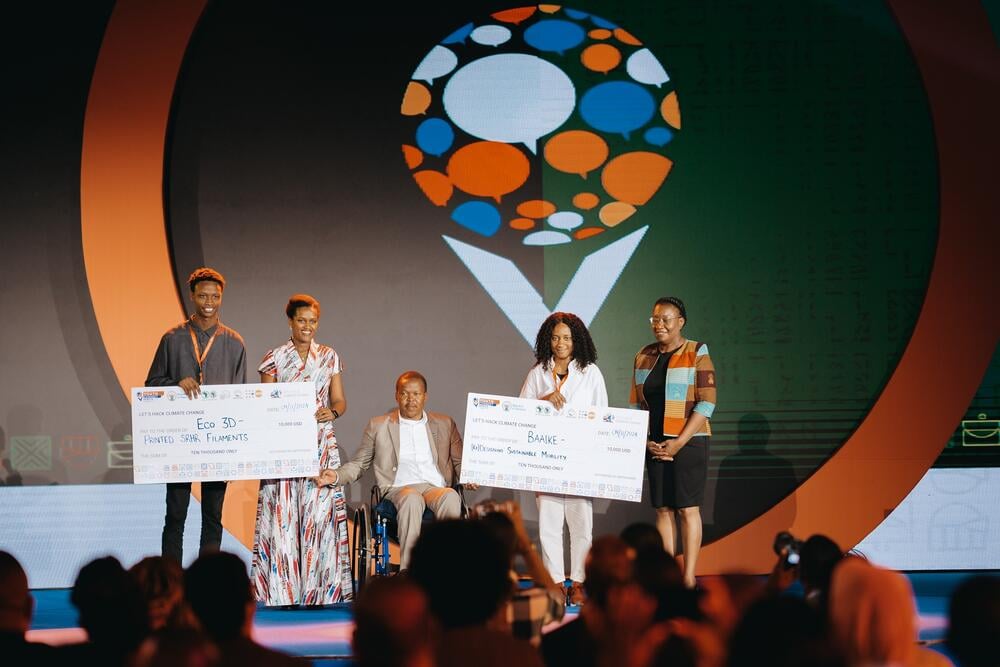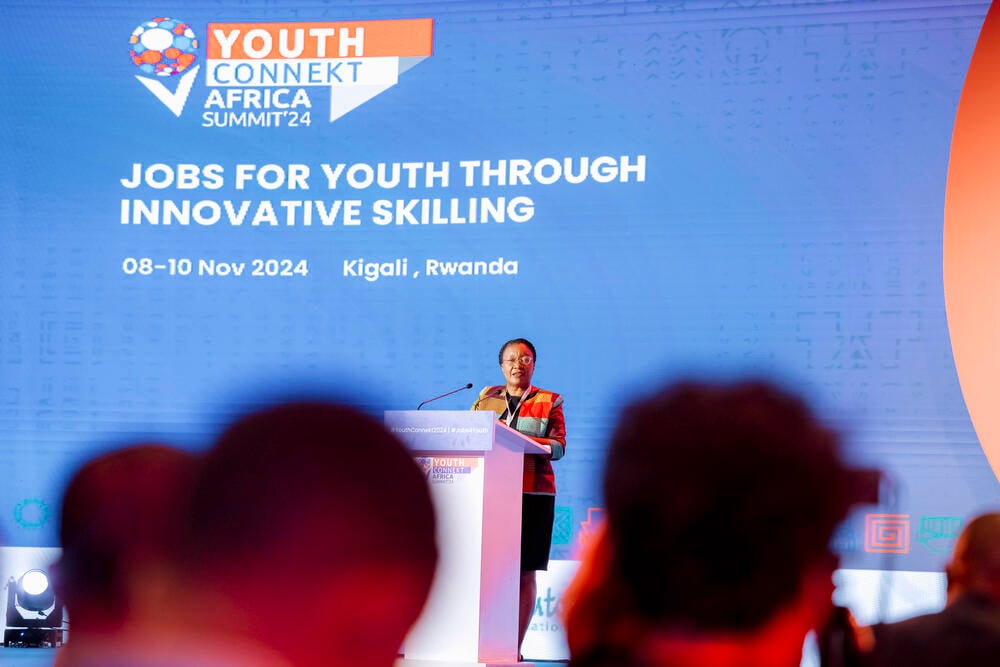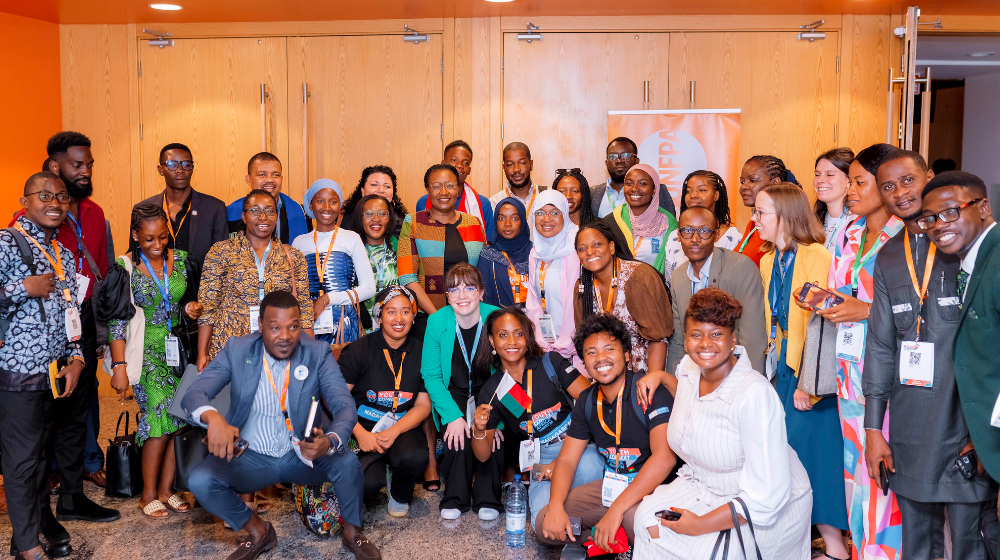KIGALI, Rwanda — UNFPA highlighted the transformative power of Africa’s youth at the YouthConnekt Africa Summit 2024, where young innovators presented groundbreaking solutions for climate resilience, mental health, and sexual and reproductive health, with two outstanding projects receiving $10,000 each in support of and scaling their impact-driven ideas.
UNFPA’s HackLab 2024 celebrated young African innovators who developed solutions to address two of the continent’s pressing issues: climate resilience and sexual and reproductive health and rights (SRHR). After months of preparation and guidance from mentors, finalists from across the continent presented their innovations in Kigali, with Mozambique’s Marta Vânia Uetela and Kenya’s Gabriel Mwaingo emerging as this year’s HackLab champions. Their projects stood out for their ingenuity, potential impact, and scalability, winning them $10,000 each, mentorship, and access to a global network of partners.
Young people and the power of innovation

Marta’s solution, “Baaike – [Re]Designing Sustainable Mobility,” repurposes fishing nets and plastic waste into bicycles, offering women and girls in remote areas a sustainable and safe means to access essential services, including healthcare and SRHR resources. Marta’s innovation not only addresses environmental issues by reducing plastic waste but also promotes women’s health and empowerment through increased mobility. Gabriel’s innovation creates eco-friendly 3D printing filaments from discarded plastics, which can be used to produce educational and healthcare materials supporting SRHR education and climate resilience. His project demonstrates a sustainable approach to recycling waste while providing resources for health and education, critical to empowering youth across Africa.
In his address at the final pitch event, Bernis Byamukama, Private Sector Advisor from the African Development Bank Group, lauded UNFPA HackLabs as a “melting pot of creativity and ingenuity,” noting the HackLab’s role in encouraging youth-driven innovation.
Moreover, Dr. Olugbemiga Adelakin, UNFPA’s Country Representative in Rwanda, emphasized the connection between climate change and SRHR, highlighting how youth innovation can tackle both issues in meaningful ways. “The intersection of climate change and SRHR is both a challenge and a vital opportunity for change,” Dr. Adelakin remarked. “The HackLab has demonstrated that Africa’s youth have the vision and capacity to create impactful solutions in this critical area.”
Spotlight on youth health and well-being
In addition to the HackLab, the YouthConnekt Africa Summit included a high-level plenary on mental health and SRHR, where youth advocates and policymakers united to discuss challenges and solutions for youth health and well-being. Under the theme “Thrive Together: Elevating Youth Health and Well-being for a Brighter Africa,” the session featured keynote speeches from UNFPA Regional Director Lydia Zigomo, along with Rwandan Minister of Youth and Culture Hon. Dr. Utumatwishima Jean Nepo Abdallah, and Minister of Youth and Sports from Madagascar, Hon. Abdoulah Marson Moustapha. Lydia Zigomo emphasized the importance of integrating mental health and SRHR services, noting the economic and social costs when these issues are neglected, while Hon Dr. Abdallah and Hon Moustapha both challenged the audience to deeply consider how SRHR issues such as teenage pregnancy and poor mental health curtail young women’s prospects and limit their ability to contribute to the labour force.

Addressing the audience, Lydia Zigomo issued a call to action, underscoring the need for collaboration among governments, civil society, and young people to address the interconnected challenges facing Africa’s youth. “The ICPD@30 and the Summit of the Future highlighted the importance of SRHR and mental health for youth on this continent,” Zigomo stated. “Let’s push for a future where young people have the information, services, and support they need to thrive both mentally and physically.”
The panel session brought together policymakers and youth leaders like Karabo Veronica Khakhane from Lesotho, Irene Fouyaba from Chad, and Sam Masikini from Malawi, who shared insights from their work on SRHR and mental health in their respective communities. Khakhane demonstrated the role of young mentor mothers in supporting pregnant adolescents, while Masikini showcased low-tech innovations delivering vital SRHR information to rural Malawian youth. These stories underscored the power of youth-led solutions in creating sustainable health improvements.
Throughout the summit, UNFPA, in partnership with the Rwanda Biomedical Centre and Health Development Initiative, provided SRHR services to summit participants, including free HIV testing, sanitary pads, and condoms. More than 165 young people accessed these services, ensuring that they had essential health support during the event.
UNFPA’s engagement at the YouthConnekt Africa Summit 2024 demonstrated the agency’s commitment to empowering youth as active partners in Africa’s development. Through initiatives like the HackLab, UNFPA fosters innovative solutions, youth leadership, and partnerships to create a future where all young people can thrive.
For media inquiries, please contact:
Daisy Leoncio, Regional Communications Advisor,
UNFPA East and Southern Africa
Email: leoncio@unfpa.org
Emile Ndayambaje
Communications Analyst
UNFPA Rwanda
Email: ndayambaje@unfpa.org
Phone: +250 788 270 426



